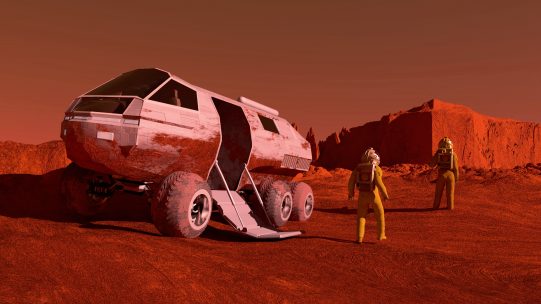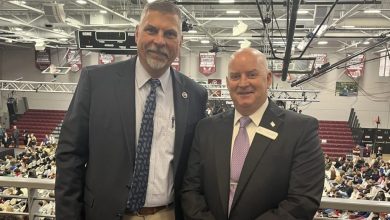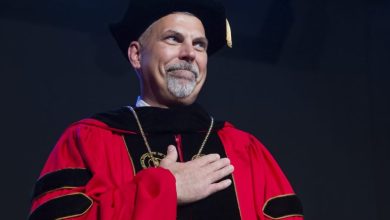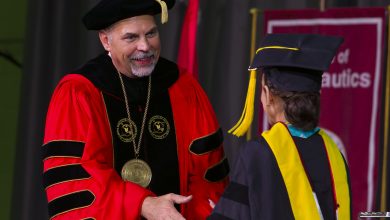Human Side of Mars Missions Focus of Buzz Aldrin Space Institute Workshop May 30-31
Event Considers Psychological,
Sociological Challenges
MELBOURNE, FLA. — With the focus so often on the rockets and technology required to reach Mars, less attention has been paid to another component critical to the success of future missions: the crewmember.
That changes later this month when researchers from across North America gather at Kennedy Space Center Visitor Complex on Florida’s Atlantic coast for the Mars Mission Social Sciences Workshop.
Co-hosted by Florida Institute of Technology’s Buzz Aldrin Space Institute and its Institute for Cross Cultural Management, the two-day event May 30-31 will bring together leading scholars from a variety of social science disciplines to develop common characterizations of the psychological, sociological and human performance challenges associated with permanent Mars colonization, and to consider the approaches and research needed to cope with these challenges.
The workshop opens with a welcome from Andrew Aldrin, director of the Buzz Aldrin Space Institute, and then shifts into sessions based on overarching topics: psychiatric health and disorders; group and team dynamics; international and cultural issues; human factors and human-centered design; and historical, sociological, and anthropological perspectives on colonization.
Within each session will be short presentations and panel discussions. Those are scheduled to include:
- Humans and Robots on Mars: Optimal Ways to Form “Hybrid” Teams for Extreme Environments. This presentation, from Embry-Riddle Aeronautical University’s human factors professor Jason Kring, explores the science of robot-human teams in the context of a mission to Mars. Forming these teams will require more autonomous robots, natural language interactions between team members, and high levels of trust and cohesion. Recommendations, limitations, and a roadmap for future research will be presented.
- Brain Health and Restoration of Function in Space. Extended space travel and isolation brings physiological and psychological stressors. This presentation from Alexander Ring, senior scientist at the Newport Brain Research Laboratory in California, will explore how restoration of brain function with noninvasive neuro-modulation in populations with similar stressors has improved cognition, quality of life, and sleep and what of that work may be applicable to supporting brain health in space.
- Extremely Stressed and Extremely Bored: Team Self-Maintenance in Long Duration Space Exploration. From workshop organizer Jessica Wildman, who is research director at Florida Tech’s Institute for Cross Cultural Management, this presentation explores the mundane team functions that impact team performance and mission success and introduces the construct of team self-maintenance in the day-to-day effort to sustain psychological wellbeing and overall team performance.
- Adaptability, Resilience, and the Colonization of Mars. Travel to Mars and Mars colonization are likely to be fraught with unknown and novel circumstances to which individuals and groups will need to readily and successfully adapt. This presentation from Mindy Shoss, associate professor of psychology at University of Central Florida reviews research on individual adaptive performance and resilience to stressors, highlighting relevant insights and important knowledge gaps.
“The trailblazing men and women who will one day travel to Mars face a long, arduous journey,” Wildman said. “We are hopeful that our research and shared scholarship will allow us to develop ways to improve the probability of making those journeys successful and safe.”
The second day will be centered around forming small, multidisciplinary working groups focused on developing clear research agendas within the various sub-topics identified as critical during the first day. The second day will begin with a thorough pre-brief providing instructions and clear criteria for the outcomes of the working groups, and will conclude with formal brief-backs from each of the working groups, which should facilitate a productive wrap-up discussion and next steps.
The Mars mission will undoubtedly be an international one. “Like many large scale challenges, the Mars mission is too complex for any one organization, or any one nation, to accomplish alone,” said ICCM Executive Director Richard Griffith. “Cultural competence of the crew and support team will be a key variable in mission success.”
Wildman added, “The intended final product of the workshop is a research agenda report that is truly integrative and interdisciplinary.”
For more information, visit https://buzzaldrinspaceinstitute.com/event/mars-mission-social-sciences-workshop/.
To arrange for media coverage, please contact Adam Lowenstein (adam@fit.edu) or Shelley Preston (spreston@fit.edu) in the University News Bureau.
###





